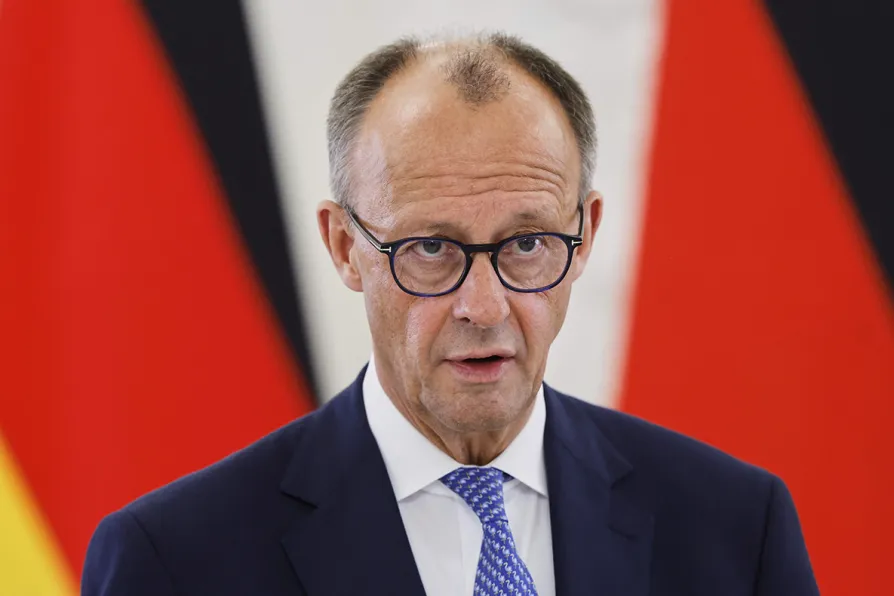As women dominate public services yet face pay gaps, unsafe workloads and rising misogyny, this International Women’s Day and TUC Women’s Conference must be a rallying point, says ANDREA EGAN
The German Chancellor seeks EU sanctions on the Nord Stream 1 pipeline to prevent future governments from resuming Russian gas deliveries, delivering a devastating blow to German industry — and German workers, writes RAINER RUPP

 German Chancellor Friedrich Merz talks to the media after a meeting with Lithuania's President Gitanas Nauseda at the Presidential palace in Vilnius, Lithuania, May 22, 2025
German Chancellor Friedrich Merz talks to the media after a meeting with Lithuania's President Gitanas Nauseda at the Presidential palace in Vilnius, Lithuania, May 22, 2025
ON MAY 23, the Financial Times reported a political bombshell: German Chancellor Friedrich Merz is actively lobbying the European Commission to impose sanctions on the Nord Stream 1 pipeline (NS-1). This manoeuvre has the potential to permanently cut Germany off from Russian pipeline gas — a decision that could profoundly impact German industry, energy prices, and political sovereignty in the long term.
Merz’s push to have the EU sanction NS-1 stems less from technical necessity than from political calculation. The pipeline remains fully operational and could resume delivering gas to Germany at any moment, provided there is political will.
However, Merz evidently lacks confidence in either the German public or future governments to adhere to the current sanctions policy. His solution is to bind their hands through EU law, as EU sanctions can only be lifted by Brussels, not by the Bundestag or by the federal government.
This initiative appears particularly paradoxical coming from a chancellor who, upon taking office, swore to “avert harm from the German people.” Yet, critics argue, Merz is acting in practice like a feudal lord, governing over the interests of the populace, and leveraging supranational instruments to undermine national democracy.
The real adversary: a potential normalisation
What exactly is driving Merz? According to the Financial Times, his greatest concern is the possibility of a US-Russian consortium reactivating NS-1. Reports indicate that a US company is already negotiating in Moscow. Under such an arrangement, Russian gas would be supplied to the EU through US companies, formally as US gas, though in reality of Russian origin.
In Germany, such a development would generate significant domestic political pressure. Polls show that nearly half of the residents of Mecklenburg-Vorpommern would welcome the resumption of Russian gas deliveries.
Prominent CDU politicians like Michael Kretschmer and Thomas Bareiss have also expressed openness to a pragmatic stance toward Russia, as has the SPD Prime Minister of the Berlin surrounding Federal State of Brandenburg, Dietmar Woidke.
Merz, however, is attempting to pre-emptively stifle these developments, not through open debate but by creating irreversible legal realities at the EU level. With such a move, he could, at a later stage, “wash his hands of responsibility” if criticism and protests over soaring energy prices in Germany continued to mount and point out that he can’t do anything as any decision on the matter lies in the hands of the EU.
According to geopolitical commentator Alexander Mercouris, Merz’s goal is clear: to make the sanctions policy against Russia impervious to change, particularly against the possibility of a future government involving the Alternative for Germany (AfD). Should the AfD or another robust opposition win a majority in the next Bundestag election, EU sanctions would block any national efforts to reopen NS-1.
This development has far-reaching consequences. It not only highlights the disempowerment of national parliaments through EU regulations but also the growing misuse of these institutions as a political shield. Merz’s strategy reveals a clear distrust of democratic mechanisms and future political majorities in Germany.
The victims of this strategy: industry, jobs, and citizens
While Merz seeks to politically ensure that no gas flows from Russia, regardless of any diplomatic workaround, the German economy is paying a steep price. Energy-intensive industries are relocating abroad, small and medium-sized enterprises are lamenting unsustainable production costs and the population is grappling with rising energy prices.
Particularly dramatic is the fact that, according to Eurostat, liquefied natural gas from the US now costs twice as much as Russian pipeline gas. The EU has thus entangled itself in an economic dependence on the US, which comes at a high cost, not only financially but also strategically.
Russian President Vladimir Putin recently commented that sanctions against Russia ultimately worsen the lives of Europeans, not Russians. Although his description of EU elites was later softened from “idiots” to “fools,” the core message strikes a chord: Europe’s political elites seem willing to prioritise geopolitical power games over the interests of their own populations.
The case of Friedrich Merz and his efforts to secure EU sanctions for NS-1 highlights a fundamental conflict between ideological foreign policy and economic reason. What is sold as a measure against Russia appears in reality to be a measure against German industry — and ultimately against the German people.
While Merz presents himself as a defender of European principles, the question arises: what exactly are these principles and who benefits from them? One thing seems certain: control over Germany’s energy security and future no longer lies in Berlin but in Brussels.

NICK WRIGHT returns to Berlin and finds a city in darkness and political turmoil

The federal government’s plans to finance the war in Ukraine with Russian assets, and a possible deployment of German troops, put the population in Germany in the highest danger, argues SEVIM DAGDELEN

The cancelled China trip of the German Foreign Minister marks a break with Helmut Schmidt’s China policy and drives Germany further into Washington’s confrontation course, warns SEVIM DAGDELEN











